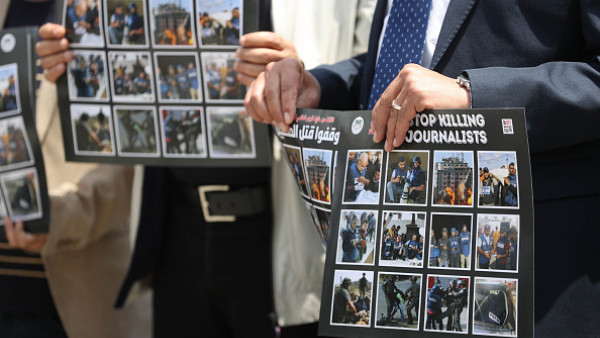Israeli forces are accused of deliberately going after journalists covering the war in Gaza or deadly raids in the West Bank [Getty/archive]
A harrowing investigation has uncovered details of Israeli forces’ targeting an Al Araby TV news crew in the occupied West Bank in May, highlighting the dangerous circumstances in which journalists live in occupied Palestine.
Forbidden Stories, an organisation which works with journalists under threat of imprisonment or murder, published an investigative report in which they spoke to journalist Ameed Shehadeh and cameraman Rabi Al-Munayer of Al Araby TV, a Qatar-based sister outlet of The New Arab.
The investigation was published in late June as part of the “Gaza Project” led by the Forbidden Stories and joined by an international network of 50 journalists from 13 different media outlets.
On 4 May, Israeli forces fired three bullets towards Shehadeh and Al-Munayer who were covering a military raid in the town of Dayr al-Ghusun near Tulkarm and the clashes which ensued with Palestinian fighters.
Two of the bullets hit the camera, only half a meter away from Shehadeh and a mere 30 centimetres away from Al-Munayer.
The Israeli soldiers knew in advance that the two journalists were set up on a hill only 290 meters away from the nearest point of clashes, according to another six journalists who were also reporting in Dayr al-Ghusun that day.
It was clear that the two were members of the press, wearing their protective vests and helmets and carrying their equipment.
Forbidden Stories gathered information and footage from open sources, which showed that the journalists were clearly visible to the Israeli soldiers, who were in three cars 60 meters away from Shehadeh and Al-Munayer. This was confirmed by Al Araby TV’s live broadcast on the morning of 4 May, from 8:20 until the incident was announced at 10:43.
Al-Munayer’s camera was recording during the attack, and the journalists could be heard talking as the first two bullets were fired that hit their equipment. As a result, the camera stopped working and the broadcast was cut off.
At first, the journalists weren’t sure where the gunfire was coming from, before realising the shots came from the Israeli army vehicles.
“When an intermediate calibre gun is fired towards a recording device, two distinct sounds are typically captured: the supersonic sound of the bullet and the muzzle blast,” Forbidden Stories wrote in its investigation, citing an independent analysis by Earshot, an audio research agency.
“Both sounds were audible in Al Araby TV’s 34-second video, with a long enough interval between the sounds to indicate the recording device was in the line of fire,” says Earshot.
The analysis says for the second gunshot – the first of two to hit the camera – the shooter would have been around 62 meters away, which is roughly the same distance the two journalists were stood from the Israeli vehicles.
Shehadeh tells Forbidden Stories what the Israeli military did was a message directed at him and his colleague.
“Please record what I say in case anything bad happens,” he said. “We as reporters who are working in the West Bank feel now more than ever that we could go for a report and never come back.”
But the two continue to report from the West Bank, which has seen a spike in deadly Israeli raids since the start of the Gaza war. More than 500 Palestinians have been killed in the territory since October 7 alone, in addition to the more than 38,000 killed by Israel’s offensive in Gaza.
Israel has been accused of deliberately targeting journalists in the Gaza Strip during its nine-month offensive on the enclave. At least 108 journalists have been killed as of July 5, according to the Committee to Protect Journalists NGO. Dozens more remain in detention, and offices belonging to local and international newspapers and television stations have been struck.
The Israeli military denies it intentionally targets reporters, and even after the killing of senior Al Jazeera journalist Shireen Abu Akleh in 2022 took months to admit wrongdoing.
As part of its “Gaza Project,” Forbidden Stories asked participants if they thought the Israeli army was purposely targeting media workers in Gaza, or if these journalists were merely collateral damage.

